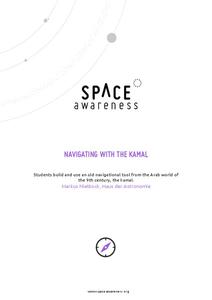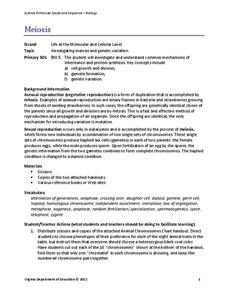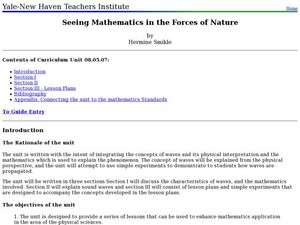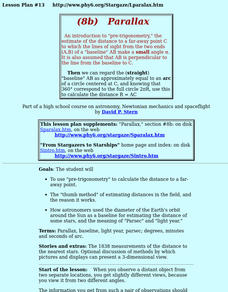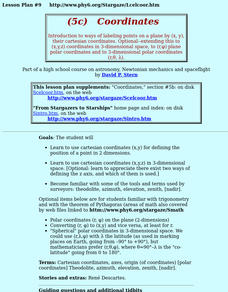Space Awareness
Navigating with the Kamal
Historians have proven that as early as 1497 skilled navigators were using a kamal to sail across oceans. Scholars learn about navigation tools and astronomy before building their own kamals. They then learn how to use it to determine...
Curated OER
Wind Effects on Model Building: Pre-Lab for Truss Design and Testing
Emerging engineers perform pre-lab calculations in this first of a three-part lesson on model building. They determine the forces of tension and compression in a truss. After completion of the worksheet, pupils will draw a draft of their...
Curated OER
Attributes of Renewable Energy: From Nanopossibilities to Solar Power
High schoolers explore solar energy, why we use it and how we use it. In this renewable energy lesson students compare active and solar techniques.
Curated OER
Vectors
High schoolers listen to a lecture and complete a number of problems as they go. There are a variety of examples given and they are guided through the problem solving steps for each of the real-world scenarios regarding the purpose of...
Curated OER
Solar System Hall Model
Not novel, but fun, this activity gets your space science learners to model the size of the planets and the solar system along your school's hallway. Scaled measurements as well as actual distances are provided for both planet diameters...
Curated OER
Meiosis
Using yarn and chenille stems, lab groups collaborate to model mitosis and meiosis. Brief background information and a vaguely written procedure comprise this outline. More instruction needs to be provided to learners about cell division...
Curated OER
Transmitter Hunt
Pupils experiment with radio transmitters. In this transmission of waves lesson, students use an FM radio, an attenuate, and the frequency to locate a radio transmitter. Pupils discuss outcomes.
Curated OER
Seeing Mathematics in the Forces of Nature
Students study waves and their characteristics. In this wave lesson students calculate the speed of waves, wavelength and the period.
Curated OER
Parallax
Pupils discover how astronomers used the diameter of the Earth's orbit around the Sun as a baseline for estimating the distance of some stars, and the meaning of "Parsec" and "light year."
Curated OER
Coordinates
High schoolers use cartesian coordinates (x,y,z) in 3-dimensional space. [Optional: appreciate there exist two ways of defining the z axis, and which of them is used.] They become familiar with the tools and terms used by surveyors.
Curated OER
What's Your Latitude?
Students measure the height of items using an astrolabe. In this latitude lesson students construct a sextant and determine height and latitude with it.
Curated OER
Lab for Truss Design and Testing
Students design and build their own truss. In this physics lesson, students calculate the forces and maximum load. They complete a full scale diagram of their design.
